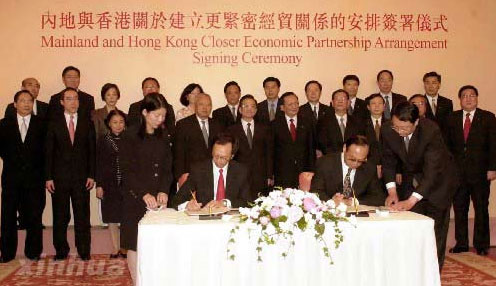
What is CEPA?
The Closer Economic Partnership Arrangement (CEPA) is a free trade agreement between Chinese mainland and Hong Kong that offers Hong Kong products, companies and residents preferential access to the mainland market. To date, eight supplementary agreements to CEPA containing further concessions have been agreed by the two sides.
Objectives
1. Progressively reduce or eliminate tariffs and non-tariff barriers on substantially all the trade in goods between the two sides;
2. Progressively achieve liberalization of trade in services through reduction or elimination of substantially all discriminatory measures;
3. Promote trade and investment facilitation.
 |
|
The signing ceremony of the Mainland and Hong Kong Closer Economic Partnership Arrangement, June 29, 2003. [Photo/Xinhua] |
Trade in goods
Qualifying goods
All products of Hong Kong exported to Chinese mainland may enjoy tariff free treatment except for certain types of prohibited articles on condition that the products meet the prescribed rules of origin (ROO). For products falling under a large number of tariff codes, the ROO have already been determined. For products that to date have no agreed ROO, there exists a mechanism whereby interested enterprises may apply and request to include the products in subsequent phases of ROO discussions which will be held twice a year.
To qualify for duty free import, products must satisfy the ROO requirements. Under these requirements products are deemed to be of Hong Kong origin if they satisfy either of the following conditions: the products are obtained entirely in Hong Kong or the goods have undergone substantial transformation in Hong Kong.
Trade in services
Service sectors
CEPA provides for liberalised market access in a wide range of service sectors ahead of China's liberalisation schedule pursuant to its WTO obligations and facilitates the recognition of Hong Kong professional and technical qualifications. Under the most recent supplement, as from 1 April 2012, three new service sectors as well as 13 existing service sectors will be further liberalised. The total number of service sectors covered by CEPA will be expanded to 47 as follows:
• Accounting
• Patent agency
• Advertising
• Photographic
• Air transport
• Placement and supply services of personnel
• Audiovisual
• Printing
• Banking
• Public utility
• Building-cleaning
• Rail transport
• Computer and related services
• Real estate
• Construction and related engineering
• Related scientific and technical consulting services
• Convention and exhibition
• Research and development
• Cultural
• Road transport
• Distribution
• Securities and futures
• Environmental
• Services incidental to mining
• Examinations for professional and technical qualification
• Services related to management consulting
• Freight forwarding agency
• Services incidental to manufacturing
• Individually owned stores
• Social services
• Insurance
• Specialty design
• Interdisciplinary research and experimental development services
• Sporting
• Legal
• Storage and warehousing
• Library, archives, museums and other cultural services
• Technical testing, analysis and product testing
• Logistics
• Telecommunications
• Management consulting
• Tourism
• Maritime transport
• Trade mark agency
• Market research
• Translation and interpretation
• Medical
Benefits
The CEPA benefits in services are situated mainly in four areas:
• earlier market access: Hong Kong service suppliers can enter the PRC between one to five years earlier than under the WTO timetable;
• higher equity share: Hong Kong service suppliers are permitted to hold a higher equity share (in certain service sectors even up to 100%) in PRC service companies;
• lower capital thresholds: capital requirements to set up in the PRC have been reduced substantially thus opening up the field to smaller players; and
• recognition of Hong Kong qualifications: eligible Hong Kong residents are allowed to take qualification examinations for professionals and technicians in the Mainland in a wide range of specialisations and to obtain the relevant professional qualification certificates.
Trade and investment facilitation
The two sides agreed to further strengthen economic and trade cooperation through trade and investment facilitation in ten areas: trade and investment promotion; customs clearance facilitation; commodity inspection and quarantine, food safety, quality and standardisation; electronic business; transparency in laws and regulations; cooperation of small and medium enterprises; cooperation in industries; protection of intellectual property; cooperation on branding; and cooperation on education. Under CEPA VIII, the two sides agreed to further strengthen cooperation in commodity inspection and quarantine and food aspects. Further, the two sides agreed to strengthen collaboration in science and technology, and to support the establishment of a branch of the Chinese National Engineering Research Centre in Hong Kong as well as to set up a High-Tech Industrialization Base in Hong Kong.